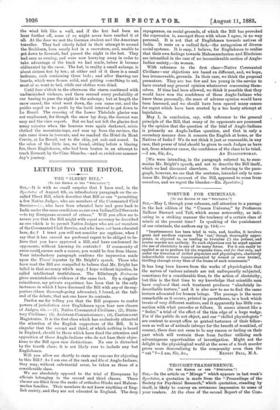LETTERS TO THE EDITOR.
THE " ILBERT BILL."
ITO THE EDITOR OP THE "SPECTATOR.") BIR,--It is with no small surprise that I have read, in the Spectator of August 4th, an introductory paragraph on the so- called Ebert Bill, which describes- that Bill as one "permitting a few Native Judges, who are members of the Covenanted Civil Service—i.e., who have been educated here and gone back to India under the same conditions as our own Indian Civil Servants —to try Europeans accused of crimes." Will you allow me to assure you that the Bill might with equal accuracy be described as one which is to permit Native Judges who are not members of the Covenanted Civil Service, and who have not been educated here, &c. ? I trust you will not consider me captious, when I say that it has caused me profound regret to be obliged to be- lieve that you have approved a Bill, and have condemned its opponents, without knowing its contents ? If community of error could excuse such a course, you would be free from blame. Your introductory paragraph confirms the impression made upon the Times' reporter by Mr. Bright's speech. Those who have read the Bill are compelled to believe that Mr. Bright has failed in that accuracy which may, I hope without injustice, be called intellectual truthfulness. The Edinburgh Scotsman gives unmistakeable evidence of the same fact. By a singular coincidence, my private experience has been that in the only instances in which I have discussed the Bill with any of its sup- porters (three thorough-going advocates), I found, at the tail- end of the debate, that not one knew its contents.
Pardon me for telling you that the Bill proposes to confer powers of jurisdiction over Englishmen upon four new classes of Judges, viz. :—(I), Native Covenanted Civilians ; (2), Statu- tory Civilians ; (3), Assistant-Commissioners ; (4), Cantonment Magistrates. It is the first class which has exclusively attracted the attention of the English supporters of the Bill. It is singular that the second and third, of which nothing is heard in England, should be those which have fixed the attention and opposition of those Anglo-Indians who do not base their objec- tions to the Bill upon race distinctions. No one is disturbed by the fourth class; it is not likely ever to include any but Englishmen.
Will you allow me shortly to state my reasons for objecting to this Bill ? As I am one of the rank and file of Anglo-Indians, they may, without substantial error, be taken as those of a considerable class.
We are absolutely opposed to the trial of Europeans by officials belonging to the second and third classes. These classes are filled from the ranks of orthodox Hindu and Mahom- • medan families. Their members do not know anything of Eng- lish society, and they are not educated in England. The deep repugnance, on social grounds, of which the Bill has provoked the expression is, amongst those with whom I agree, in no way personal. It is not that of Englishmen towards natives of India. It rests on a radical fact,—the antagonism of diverse social systems. It is easy, I believe, for Englishmen to realise that their own feelings towards Mahommedanism and Hinduism are intensified in the case of no inconsiderable section of Anglo- Indian society,—its women.
With reference to the first class—Native Covenanted Civilians—our objections are based on different, and, we hope, less irremoveable, grounds. In their case, we think the proposal premature. They are too few and too young in the service to have created any general opinion whatsoever concerning them- selves. If time had been allowed, we think it possible that they- would have won the confidence of those Anglo-Indians who• knew them personally, the mass of adverse opinion would have been leavened, and we should have been spared many causes- for regret which have been created by a too hasty attempt at legislation.
May I, in conclusion, say, with reference to the general• principle of the Bill, that many of its opponents are possessed by the opinion that the question of the trial of Anglo-Indians• is primarily an Anglo-Indian question, and that in only a secondary manner does it concern the English at home, or the Natives of India P We do not think it just or reasonable, in any case, that power of trial should be given to such Judges as have- not, from whatever cause, the confidence of the class to be tried.
[We were intending, in the paragraph referred to, to sum- marise Mr. Bright's speech, and not to describe the Bill itself, which we had discussed elsewhere. On referring to the para- graph, however, we see that the sentence, intended only to con- dense Mr. Bright's account of the Bill, appeared to come from ourselves, and we regret the blunder.—En. Spectator.]


































 Previous page
Previous page